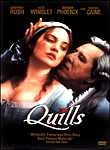
Quills (2000)
dir. Philip Kaufman
starring: Geoffrey Rush, Kate Winslet
genre: Drama
awards: Academy Award Nominee
Every writer's dream is to be so overcome by a passion to express and create that writing itself becomes an obsession. When this happens, concern for anything else -- loved ones, external strictures, even physical needs like food and water -- is dispelled. While few writers actually attain this state of fecund rapture, the infamous Marquis de Sade was one who did.
Although at times a difficult film to watch, Quills is nearly unrivaled in its portrayal of a man who's true devotion to writing is his lifeblood. "My writing is like the beating of my heart," de Sade tells his captor, the conflicted Abbe de Coulmier (played by Joaquin Phoenix), who encourages de Sade to write as "a purgative for [his] corrupted mind."
Quills, directed by Philip Kaufman (The Unbearable Lightness of Being, The Right Stuff, Henry and June -- see chapter 4) is not a strictly historical biography. The screenplay by Doug Wright was adapted from his 1995 Broadway play of the same title. Here de Sade -- brilliantly depicted as a flamboyant pansexual with gleeful elan by Geoffrey Rush -- has been imprisoned in Charenton Asylum by the order of the Emperor Napoleon Bonaparte, no less, who views de Sade's writings as "the most abominable book ever engendered by the most depraved imagination." But for de Sade, "Art is waiting to be born" -- irregardless of his circumstances. Ironically, it was this very incarceration in a luxuriously furnished cell that afforded him both the time and privacy needed to produce his pornographic works.
In the film it is the succulent Madeleine (Kate Winslet), a virginal prison laundress, who inspires de Sade as would a Muse, and equally serves as a conspirator by smuggling his scandalous pages -- so freshly written that "the ink is still wet," he teasingly rebukes -- to a waiting horseman and subsequent printer. Although Madeleine is a member of the lower class, her native intelligence and desire to learn -- "Reading is my salvation," she tells the Abbe -- make her more than just an attractive body to the marquis.
After de Sade's Justine is published, the essentially good Abbe Coulmier is pressured into revoking the marquis's writing privileges. It is at this point that de Sade's character begins to make its slow transformation from sociopathic confidence and spoiled conviviality to an artist's desperation for personal expression. After his quills and paper are removed from his room, de Sade, at meal time, ingeniously ravages a plump roasted chicken until he tears free the wishbone; and for ink, there is always the decanter of red wine. The sheets upon which he writes are not made of paper, but are the linen ones on which he sleeps. Back in business, de Sade hums a tune of pleasure as he sets forth word after word. Madeleine then takes the sheets and copies out the work on paper. It seems like a workable solution until the claret-colored sheets are discovered.
No more wine . . . or bones, for that matter. Sade's room is emptied of all creature comforts, save a mirror and his clothes. The marquis then uses the first "ink" of humankind: blood. After breaking the mirror, he pricks each finger until all ten are raw with wounds and bound up with strips torn from his waistcoat. A mirror shard has served both as needle and writing increment. His clothes -- jacket, vest, shirt, trousers, socks, even shoes -- are now a tableau of literary vignettes. "My writing lives!" he shouts like a thrilled and determined child.
But his ingenuity is unappreciated. When at last it seems as if there is nothing more of which to deprive him, in humiliation de Sade is stripped even of his clothes. The metaphor is powerful: a writer without words is naked.
When it seems that every recourse has been denied him, in a state of mental and emotional anguish, de Sade -- an artist possessed -- devises a plan to transport brief passages of a new story in a kind of vocal relay of messengers through the walls of the prison, from one inmate to the next, until, at the end of the line, Madeleine transcribes his words. Unfortunately, this scheme results in tragic consequences.
Then the marquis is physically tortured and placed in a dungeon. Like an abused animal or an abandoned child, he is left, to the squalor of his own feces, which -- out of sheer desperation -- he uses to write his final words.
The act of writing is a writer's redemption.
The Marquis de Sade was a writer. One may or may not appreciate his controversially lascivious material; but he was a writer who wrote everyday for some forty years. And during his lifetime in the late-eighteenth and early-nineteenth centuries, laptops did not exist. Writers wrote by hand. (Indeed, as for fifteen hundred years they had written the world's classical literature.) In a sense the notion of a quill as a writing implement bears a metaphoric loftiness, multifarious permutations of writing and spirituality. A quill is a feather from a winged creature: to write with "wings" is to fly, to soar through imaginative realms, to approach the gods.
|
